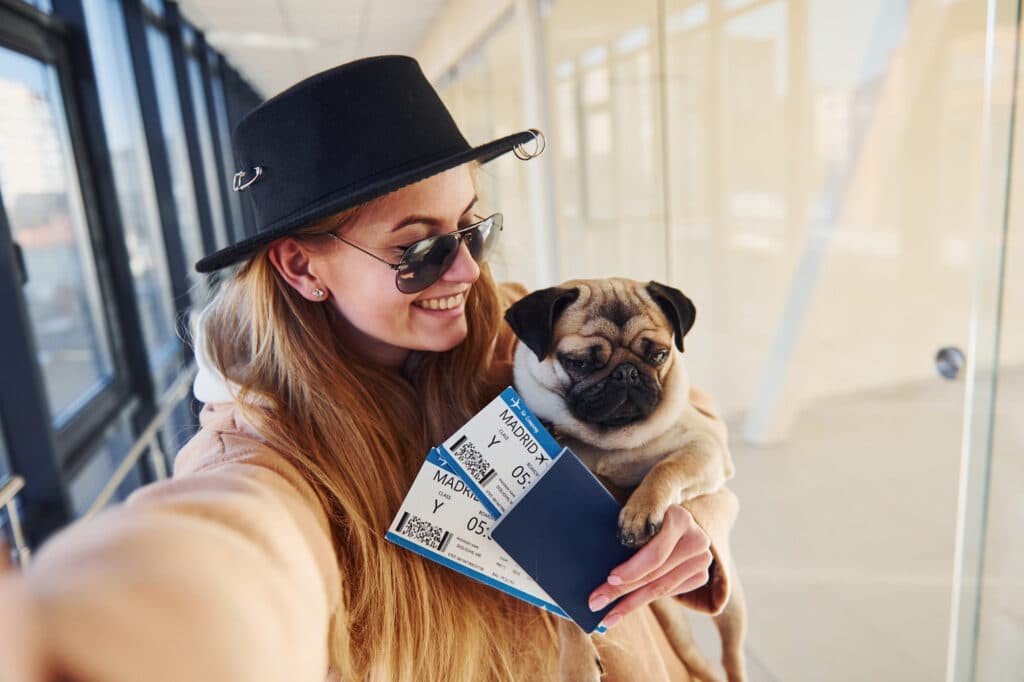Traveling with your furry friend across Europe has never been easier! With more airlines accommodating pets in the cabin or cargo, you can now bring your pet on European adventures without a hitch. This guide walks you through everything you need to know about flying with pets on European airlines.
From airline pet policies and pricing to prepping your pet for a smooth journey, you’ll find everything you need here.
Before we get going: Always remember that each airline has its own specific guidelines, so be sure to check the latest information directly on their websites.

European Airlines And Their Pet Policies
Each airline has specific policies to ensure a safe and comfortable journey for pets, so let’s dive into the details. Here’s a breakdown of the pet travel rules for the most popular European airlines.

Lufthansa
Lufthansa allows small dogs and cats to travel in the cabin on most domestic and international flights.
- Size Requirements: Pets (combined with their carrier) must weigh no more than 8 kg. The carrier should measure up to 55 x 40 x 23 cm.
- Cost: €60 for pets in the cabin; €100-€200 for pets in cargo, depending on the destination.
- Checked Luggage: Lufthansa does not allow pets as checked luggage; however, larger pets can travel in the cargo hold on select routes.
- Other Notes: Certain international routes and locations may have restrictions. Always refer to Lufthansa’s Pet Policy page for the most up-to-date information.
Air France
Air France allows small pets in the cabin on both domestic and most international routes.
- Size Requirements: Pets and their carrier must weigh under 8 kg. Carrier dimensions should be no more than 46 x 28 x 24 cm.
- Cost: €40 for flights within Europe; up to €400 for long-haul flights.
- Checked Luggage: Air France does not allow pets as checked luggage; however, larger pets can be transported via cargo.
- Other Notes: Some destinations, especially overseas locations, have restrictions on pet travel. Refer to Air France’s Pet Policy page for the latest guidelines.
Turkish Airlines
Turkish Airlines allows small pets in the cabin on both domestic and many international flights.
- Size Requirements: Pets and carriers must weigh under 8 kg. Carrier dimensions should not exceed 23 x 30 x 40 cm.
- Cost: €70 – €300, depending on the distance traveled.
- Checked Luggage: Pets heavier than 8 kg or larger pets must travel in the cargo hold.
- Other Notes: Turkish Airlines allows a wide variety of pets, including birds and rabbits. Be sure to check Turkish Airlines’ Pet Policy page for detailed information on specific routes.
Wizz Air
Wizz Air only allows guide dogs to travel with their owners in the cabin.
- Size Requirements: Not applicable as only guide dogs are permitted.
- Cost: Free for guide dogs.
- Checked Luggage: Wizz Air does not allow pets as checked luggage or in the cargo hold.
- Other Notes: Wizz Air’s pet policy is highly restrictive and does not accommodate pets other than guide dogs. For more details, visit Wizz Air’s Animal Policy page.
LOT Polish Airlines
LOT Polish Airlines permits small pets to travel in the cabin on domestic and most international flights.
- Size Requirements: Pets with their carriers must weigh under 8 kg. Carrier dimensions should not exceed 55 x 40 x 20 cm.
- Cost: Starting at €50 for cabin pets; €120 for pets in cargo.
- Checked Luggage: Pets that exceed cabin size/weight restrictions can travel as cargo.
- Other Notes: LOT requires up-to-date pet documentation and health certificates for travel. Check LOT Polish Airlines’ Pet Policy page for specifics on documentation and travel restrictions.
Prepping Your Pet For Air Travel
Flying can be a stressful experience for pets. But it doesn’t have to be! Here are some helpful tips to get your pet ready for a smooth journey:
Get Your Pet Used to the Carrier
Introduce your pet to the carrier a few weeks before the flight. Encourage them to spend time inside by placing familiar items, like a blanket or toys, to create a cozy space. Practice short car rides with the carrier to help your pet adjust to the feeling of being in a confined space.
Limit Food and Water Before the Flight
Give your pet a light meal a few hours before departure, and limit water intake close to the flight. This reduces the risk of discomfort during the trip. For longer flights, consult your vet about safe strategies for hydration without overfeeding.
Exercise Before the Flight
A good play session or walk before heading to the airport can help your pet release energy and feel calmer during the flight. Physical activity helps reduce anxiety, making it easier for your pet to settle down in the carrier.
Consider a Checkup
Schedule a vet appointment prior to your trip. Your vet can provide travel-specific advice and may recommend calming products if your pet is prone to anxiety. Ensure that your pet is healthy and up-to-date on all vaccinations, and bring any prescribed medication in case of emergencies.
Pack Essential Pet Supplies
Make sure you bring essential items like collapsible water bowls, a leash, a few treats, and clean-up bags. For long flights, consider bringing disposable pads or absorbent materials in case your pet needs to relieve itself.
Pet Carrier Requirements
When planning air travel with your furry friend, selecting the proper carrier is crucial for a comfortable, stress-free experience. Airlines have specific rules to ensure both your pet’s comfort and safety and to make sure the carrier fits neatly in the cabin. Here’s what to consider:
1. Understand the Size Requirements
Airlines require that in-cabin carriers be compact enough to slide under the seat in front of you.
Generally, this means aiming for a size around 18” x 11” x 11”, though dimensions can vary.
Double-check your airline’s guidelines to avoid any surprises at check-in.
2. Pick the Ideal Carrier Style
Soft vs. Hard Carriers: Soft-sided carriers offer more flexibility, allowing you to adjust them to fit tighter spaces under the seat—ideal if the airline has strict size limits. Hard-sided carriers provide more protection but can be less adaptable in tight spaces.
Ventilation Matters: Opt for carriers with mesh or ventilation panels on at least two sides to ensure good airflow, which helps keep your pet cool and comfortable.
3. Prioritize Comfort
A cozy base is essential for your pet’s comfort. Look for a carrier with a soft, padded bottom, or add a small pet blanket. Your pet should have enough room to stand, turn around, and lie down comfortably, which is especially important on longer flights.
4. Ensure Security and Accessibility
Choose a carrier with secure zippers or clasps to prevent your pet from escaping but also with easy access points for you. Some carriers also have small “peek windows,” allowing you to check on your pet and offer treats or comfort without fully opening the carrier.
5. Confirm the Weight Limit
Airlines typically impose weight restrictions for pets traveling in the cabin, often around 20 pounds including the carrier. Verify your airline’s rules on combined weight limits to avoid any last-minute issues.
6. Add Identification Tags
Attach a tag with your pet’s name, your contact details, and flight information. This not only helps airline staff if needed but also provides peace of mind knowing that your pet’s carrier is clearly labeled.
Booking Tickets For Your Pet
Booking a tickets if you’re planning on flying with pets on European airlines is actually pretty easy.
But it does require early planning and attention to detail. With many airlines limiting the number of pets allowed per flight, arranging your pet’s ticket as soon as you book your own is highly recommended. Here’s a quick guide to save you some trouble:
Check Airline Pet Policies: Each airline has specific guidelines regarding pet travel, including size and weight restrictions, permitted routes, and additional fees. Make sure to review these policies in detail on the airline’s website.
Contact Customer Service: To book a pet ticket, it’s a good idea to just call the airline’s customer service directly. That’s because online booking systems typically don’t offer options for pet reservations. When speaking with a representative, confirm there is available space for your pet on your chosen flight. It’s also a good idea to get a booking confirmation in writing.
Complete Necessary Documentation: Traveling with a pet internationally often requires documentation, such as a pet passport, proof of vaccinations (especially rabies), and a health certificate issued by a licensed veterinarian. Make sure to start gathering these documents well before your flight to avoid last-minute issues – some paperwork needs to be completed weeks in advance.
Review Any Special Instructions or Restrictions: Some airlines impose specific restrictions on pet breeds, especially for brachycephalic (short-nosed) breeds, as they are more prone to respiratory issues during flights. Always verify any breed-specific policies to ensure compliance and safety for your pet.
Download The Air Doctor App
With the Air Doctor app in your pocket, you can access medical care and receive expert medical guidance wherever you are in the world!
Air Doctor’s easy-to-use app gives you:
- A global network of over 20,000 multi-lingual doctors and specialists
- Choice of clinic, at-home (hotel), and video consultations
- Active in 78 countries
- 24/7 multi-lingual support
- Transparent pricing, and reviews
- Most common medical specialties
- So much more













